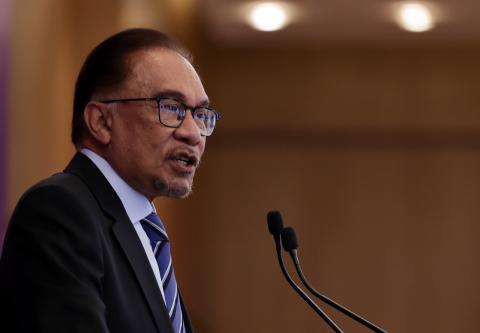By Massita Ahmad
SINGAPORE, Dec 6 (NNN-Bernama) — Malaysian Prime Minister Anwar Ibrahim’s efforts at inclusive growth offer important lessons to the West and the rest of the Global South alike, says an internationally recognised strategist of the multipolar world.
Dr Dan Steinbock observed that Anwar has often talked about his vision for Malaysia, suggesting the country could emerge as “a great economic working model for a pluralistic society, through peace, compassion, and harmony”.
Steinbock is the founder of the global consultancy Difference Group Ltd which helps governments, companies, and organisations in both the West and the Global South to navigate in the multipolar world economy.
He was responding to Bernama via email on his views related to Anwar’s leadership at home and abroad as his Madani Government will be celebrating its first year at the end of this week.
Anwar was sworn in as Malaysia’s 10th prime minister on Nov 24, 2022.
Steinbock further said that the positive reaction of the financial markets to the Madani government reflects the perception that the new unity is seen as a stabilising force.
“The quest for sustainability and digital transformation indicates a future-driven approach. The focus on the economy, cost of living, and good governance is appropriate.
“Budget debates suggest structural reforms may face political headwinds. Still, the early signs are promising,” said the expert in global economy.
Responding to the Malaysian economy’s state of health, Steinbock said in the coming quarters, economic recovery is likely to be gradual.
This, he said, has less to do with Malaysia than with the impact of the weakening global demand and restrictive monetary conditions.
“Both factors have adverse implications worldwide; particularly in relatively open, trading commodity exporters, including Malaysia.
“In such conditions, Malaysia’s expected real Gross Domestic Product (GDP) growth of about 3.9 per cent in 2023 is a decent response in the dire international environment,” he said.
Bilateral relations between Malaysia and Singapore, since the Madani government came into power, is one of the developments that attracted his attention.
According to him, when the international environment is fragmented, it fosters divisive forces domestically as well.
“In such times, the Pakatan Harapan-led unity government is important. The Madani government seems to have surpassed the perceived uncertainties associated with the hung parliament.
Asked to give a score of 1-10 on Anwar’s leadership, Steinbock has this to say: “Considering the dire scenarios that hovered over Malaysia only a few years ago, and ones that resurfaced with the hung parliament, Anwar Ibrahim’s leadership may have earned a “good” score.
“But the toughest tests are still ahead. If Anwar’s leadership can then sustain political unity and economic development, it will inch closer to “excellent”.
Steinbock has served in the India China and America (ICA) Institute, Shanghai Institutes for International Studies (China), and the EU Centre (Singapore).
He has lived in Europe, the US, Asia and the Middle East and travelled in most world regions. A senior Fulbright scholar, he came to New York City in the 1980s. Today he spends most of his time in Asia.
— NNN-BERNAMA






